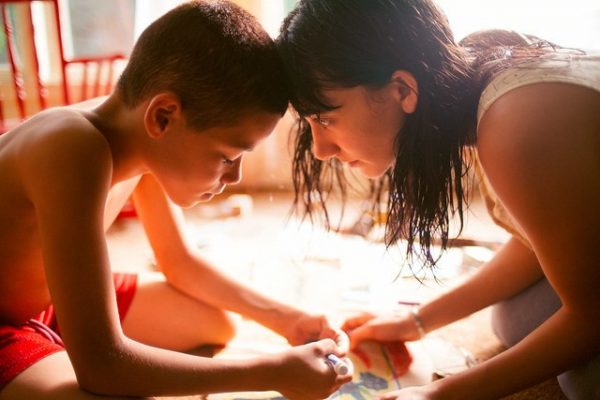Documentarian Jeremiah Zagar’s first narrative feature is an elliptical, arthouse take on the standard coming-of-age drama. Seen through the eyes of a ten-year-old boy, it covers a year in the life of a mixed-race family dealing with poverty and domestic abuse in rural America. It’s a potent and elliptical movie, but one where its own sense of beauty and wonder threatens to undermine its sadly prosaic tale of the American underclasses.
Jonah, Manny and Joel are young brothers running hog wild in a rural working-class community in upstate New York. Ma (Sheila Vand) and Paps (Raúl Castillo) often seem far too preoccupied with their tempestuous relationship to take too much heed of what their sons are up to. The trio is like a tiny tribe of Mowglis, not quite adjusted after being transplanted from the jungle. They fight and tumble like wolf cubs. Jonah (Evan Rosado) is more sensitive than his brothers and turns to a journal to make sense of his tumultuous home life and, over the course of the film, his awakening sexuality.
Zagar’s woozy, impressionistic drama has been compared to both Moonlight and the recent output from Terrence Malick. There are shots in the film that echo Barry Jenkins‘ Oscar Winner, and Zak Mulligan‘s lush 16mm photography certainly echoes Malick’s earthy poeticism but is moored in a more coherent and less indulgent narrative than work like Knight of Cups and Song to Song.
Zagar’s storytelling is rooted in the tiny moments that gleam amidst the clutter of childhood memory. The camera cuts frequently to Rosado’s expressive eyes to reiterate that he’s the focus. It hints that the cycle of abuse and reconciliation between his parents – his father’s bouts of violence and his mother’s depression – is so difficult to process, that he distracts himself with the scribble of the pencil on his diary, the squish of mud between his toes, the fluff on the upper lip of an older boy to whom he takes a shine.
These moments often shift into crude animations based on his drawings. These mark interstitial bridges between the depicted vignettes and pull add a magic-realist touch to the almost painfully real early style of the film. These flourishes become more frequent and pronounced as the film progresses, marking Jonah’s self-identification. Although beautifully done, these also coincide with the family’s circumstances spiralling ever downward, sanding down some of the rough edges of situation, and letting some of the family’s more troubling behaviours go unexplored.
For a first-time narrative feature on a tiny budget, Jeremiah Zagar has crafted something very impressive, not least in get Florida Project–level performances from its young protagonists. Its determination to deal with difficult subjects in shades of grey is laudable – be prepared for some unflinching imagery unusual in a film featuring such a young cast – but its silky and sinuous storytelling means there’s perhaps not quite enough grit to create a pearl. Nevertheless, We the Animals has definitely found its admirers so it won’t be a surprise if it stealthily appears on the end-of-year list of some of the more high-brow minded critics.
@Filmhouse, Edinburgh from Fri 9 Aug 2019
